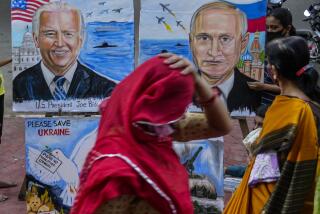A ‘Spoiler’ With Valid Security Concerns
- Share via
India is taking a lot of flak these days because of its publicly proclaimed refusal to sign the Comprehensive Test Ban Treaty. Indeed, the Washington Post has described India as a “spoiler” for standing in the way of an accord many see as a necessary first step if nuclear weapons are ever to be eliminated.
This perception certainly will be enhanced by the public repudiation of the treaty in its present form by India’s external affairs minister, Kumar Gujral, after his July 25 meeting with Secretary of State Warren Christopher at the ASEAN meeting in Jakarta.
India’s reasons for assuming this stance--its legitimate security concerns--deserve a measure of sympathetic understanding.
Delhi not unreasonably perceives an implicit double standard in provisions of the treaty that would determine who will and who will not be permitted to retain a nuclear option. The five nations that now possess nuclear arsenals (the United States, France, Britain, Russia and China) are allowed to retain them for whatever period of time it takes for them to figure out how to fully disarm. During what will surely be a protracted (perhaps even a permanent) interregnum, the privileged five would retain a decisive de facto strategic edge over the nuclear have-not nations.
In this context, what are the concerns that have gotten such short shrift from America’s nuclear wonks?
* China: India already has gone to war once with China, in 1962, over still-unresolved territorial and political differences such as Tibet. In an atmosphere of mutual distrust, India faces a severe military disadvantage if it forsakes its nuclear option while China remains a de facto nuclear power. This has special poignancy in the face of China’s reluctance to sign the treaty unless its strict inspection requirements are diluted.
* Pakistan: India has already fought three wars against Islamabad’s American-equipped army. Pakistan is obsessed with hatred of India, actively supports Kashmiri separatism and doggedly pursues a nuclear capability while blatantly ignoring all attempts by the United States and the international community to get it to desist from doing so.
* China/Pakistan: Considering China’s existing nuclear capability and Pakistan’s potential for imminent weaponization (thanks especially to China’s cynical and illegal technology transfers to Pakistan), is it so surprising that India balks at signing a comprehensive test ban treaty that implicitly brushes aside these compelling security concerns? Especially when many Indians are convinced that Washington privately winks at this unsavory relationship because it creates a mini-cordon sanitaire around India as a means of curbing its regional assertiveness.
Faced with such unpleasant realities, India should be pardoned for placing security considerations ahead of winning the hearts and minds of its detractors in the White House, Congress, the American press and the arms control establishment.
India’s reluctance to enter into this proposed accord also stems from some very formidable domestic political pressures. The long-ruling Congress Party’s loss of the recent election is in part attributable to the public’s perception that the government was soft on external threats to India’s national security. The Congress Party’s fragile United Front successor--a patchwork of several ideologically disparate parties--cannot survive if the nation now abandons its current stand on the test ban treaty. If the United Front falls, the political beneficiary almost certainly will be the Hindu nationalist BJP party. Already on record as favoring a resumption of nuclear testing, the BJP will prove far more intransigent than any Indian government yet seen by the United States.
Between the recent impasse at Jakarta and the renewal of the treaty talks in Geneva, one hopes a way can be found to surmount the double-standard issue to everyone’s satisfaction. Optimism has suffered a new setback, however, with the recent news from the G-7 summit in Lyon, France, that Britain, with Russian backing, is insisting that all the threshold states, including India, must sign on before the treaty can take effect.
This will not wash in India, as recent developments make painfully clear. With a right-wing political threat simmering at home and potential enemies glaring across its northern borders, India cannot afford to be Mr. Nice Guy. India’s negotiators in Geneva are not just playing word games. They simply cannot gloss over the domestic political realities confronting the current government.
For America and the world, the challenge is to come up with a nuclear disarmament formula that eliminates double standards, enunciates credible timetables for the total elimination of nuclear arsenals and, in the interim, provides iron-clad protection from nuclear blackmail. Not an easy task, to be sure, but the only one that has any chance of preventing India from doing what any sovereign nation worth its salt would do under such circumstances--adopting the role of “spoiler” until the international community recognizes the validity of its security concerns.
More to Read
Sign up for Essential California
The most important California stories and recommendations in your inbox every morning.
You may occasionally receive promotional content from the Los Angeles Times.









